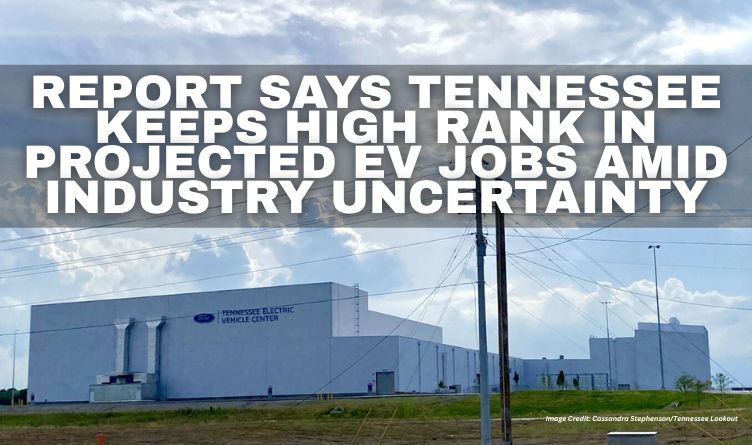Annual report on southeast EV industry rosy, but analysts took notice of slower investment growth.
Image: The Tennessee Electric Vehicle Center at Ford’s BlueOval City campus in Stanton, Tenn. on June 5, 2025. Image Credit: Cassandra Stephenson/Tennessee Lookout
***Note from The Tennessee Conservative: This article posted here for informational purposes only.
By Cassandra Stephenson [Tennessee Lookout -CC BY-NC-ND 4.0] –
Tennessee remains among the nation’s top four states for highest number of anticipated electric vehicle manufacturing jobs despite slowing industry investments, disappearing tax incentives and federal policy uncertainty, according to a new report on electric transportation in the Southeast.
The state held onto its title as runner-up for the most anticipated EV manufacturing jobs in the southeast region, with 16,262 anticipated jobs compared to top-ranking Georgia’s 26,428.
Tennessee’s place in the rankings is largely due to 5,800 jobs promised by Ford Motor Company and SK On’s BlueOval City and BlueOval SK, an electric vehicle and battery manufacturing plant in rural West Tennessee. In return for the $5.6 billion project, Tennessee offered a $900 million incentive package. While battery production at the new plant is moving forward, mass production of Ford’s next-generation electric pickup truck is now delayed until 2028 due to the company’s shift in focus to smaller, more affordable electric models.
Lengthening timelines and industry pressure to create more affordable vehicles are themes highlighted in the Sept. 10 report, which is the sixth-annual study of transportation electrification in Alabama, Georgia, Florida, North Carolina, South Carolina and Tennessee. Atlas Public Policy, a Washington, D.C.-based data analysis firm, prepared the report for the Southern Alliance for Clean Energy, a renewable energy advocacy nonprofit.
The rapid injection of EV manufacturing investments coincided with tax incentives passed under former President Joe Biden’s administration, which likely sped up investments that companies already planned to make, Atlas Public Policy founder Nick Nigro said in a webcast following the report’s release.
But tax incentives of up to $7,500 for EV consumers will now sunset on Sept. 30 as part of the Trump administration’s budget reconciliation bill — named the One Big, Beautiful Bill — passed by Congress this summer, adding to market uncertainty.
The report shows continued momentum from southeastern states, where companies have announced an all-time total of $78.8 billion in electric vehicle (EV) manufacturing investments as of June 30. That momentum has slowed considerably, according to the report, with new investments in the southeast region over the last 12 months totaling $4.8 billion, less than a third of the previous year’s $15.2 billion.
The “huge jumps in manufacturing investments” over the last few years when companies began building more domestic-based supply chains were not sustainable, Nigro said.
“There was no doubt there was going to be a natural slowdown … because that’s the normal course of business,” he said. “The question we need to keep in mind as we look ahead is how many of these potential cancellations that are happening now and into the future are because of federal policy, or just because of the normal cycle of business?”
Nigro said it’s too soon to tell.
In the meantime, Tennessee continues to make progress in building out public electric vehicle charging infrastructure, though it still lags behind the charger-per-person rates of the nation and other southeastern states.
Tennessee, like other states, has also seen companies pause or retract investments and planned jobs.
Piedmont Lithium announced in August 2024 that it scrapped plans for an $800 million investment for a lithium hydroxide processing facility in Southeastern Tennessee that would have created around 147 jobs. This is the sole Tennessee cancellation mentioned in the report, which includes data through June.
General Motors announced in September that it would temporarily lay off 700 workers at its Spring Hill assembly plant due to a temporary production slowdown for the Cadillac Lyriq, along with reduced production for its Vistiq EV. Tenneco, an auto parts manufacturer that supplies the GM plant, reported that it would lay off 82 workers in its own Spring Hill facility.
Volkswagen similarly announced that it would furlough around 160 employees and pause production of its electric SUV to align “production volume to market demand,” the Chattanooga Times Free Press reported earlier this month.

What will happen when tax credits sunset? Time will tell.
Nigro said about 80% of EV manufacturing facilities the report tracked in the southeast are already operating in some capacity or undergoing construction. The key question, he said, is whether demand will support full production at these facilities.
Stan Cross, electric transportation policy director with the Southern Alliance for Clean Energy, said it’s too early to tell how the market will react to the end of EV consumer tax credits.
“What we do know is that when we look at adoption of electric vehicles, sticker price remains a top barrier for consumers and fleet operators, even though owning an EV is much cheaper over time,” Cross said.
Nigro estimates that less than half of the electric vehicles sold in the last year qualified for the tax credit — which gives incentives for the purchase of vehicles with responsibly sourced components and North American assembly — indicating consumers are willing to pay for electric vehicles without the incentive.
Energy market analysis firm Benchmark reported in July that about half of the EVs sold in the United States were eligible for the new clean vehicle tax credit in 2025.
But the “Transportation Electrification in the Southeast” report also notes that most of the southeast’s highest-selling models were eligible for the full or partial tax credit in 2025.
“It’s going to make it tougher for some vehicles to be sold,” Nigro said, adding that companies may embrace more aggressive pricing or find other ways to squeeze costs out of production.
A manufacturing tax credit remains in place for batteries, though with tighter restrictions on foreign material sources.
“The Inflation Reduction Act, the Infrastructure Law, and even the (One Big Beautiful Bill Act) signaled to the market that if EVs are going to be purchased by Americans, ideally they’re built with as much domestic content as possible,” Nigro said.
Cross surmised that the sunsetting tax credits may provide a temporary boost to EV sales.
“We’re seeing a real run on EVs right now, as consumers see those tax credits dwindling, and I won’t be surprised if we see record-shattering third quarter sales here in the U.S. as a result,” he said.
Market share grows
Tennessee’s EV sales market share — the percentage of new vehicles purchased that are EVs — came in at 5.4%, a 35% annual growth from last year, according to the report.
This puts Tennessee in the middle of the pack, ranking fourth among the six southeastern states examined by the report. Tennessee’s market share ranks 31st in the nation.
The southeast region logged more than 912,000 cumulative EV sales during the study period, amounting to a market share of above 8%. Tennessee was responsible for 60,434 of those sales.
Charging infrastructure makes progress
Tennessee is ranked fourth in the region for number of electric vehicle chargers per person.
The state saw the lowest rate of growth in publicly accessible rapid EV chargers at 24% — a marked change from holding the highest growth rate of 60% last year.
Tennessee has 830 fast-charging ports and 1,897 slower charging ports, according to the report.
The state’s Fast Charge TN program supported EV charger installation at 35 now-operational charging sites along a 400-mile loop connecting Nashville, Knoxville, Cookeville and Chattanooga. Another 18 sites are under development, and the application period for the program’s second round of funding recently closed. The program is funded through the Volkswagen Diesel Settlement Environmental Mitigation Trust, electricity revenue from the Tennessee Valley Authority and cost share from grant recipients.
The state’s program is meant to be complemented by the federally funded National Electric Vehicle Infrastructure Program (NEVI). That program was frozen by Trump’s administration in February, but the U.S. Transportation Secretary recently released interim guidance that may allow the program to move forward after states reapply for funding. NEVI originally awarded $88 million to Tennessee to fund EV charger installation along major interstates over a 5-year period.




One Response
Meh. EVs not ready for prime time, grid not up to EVs.